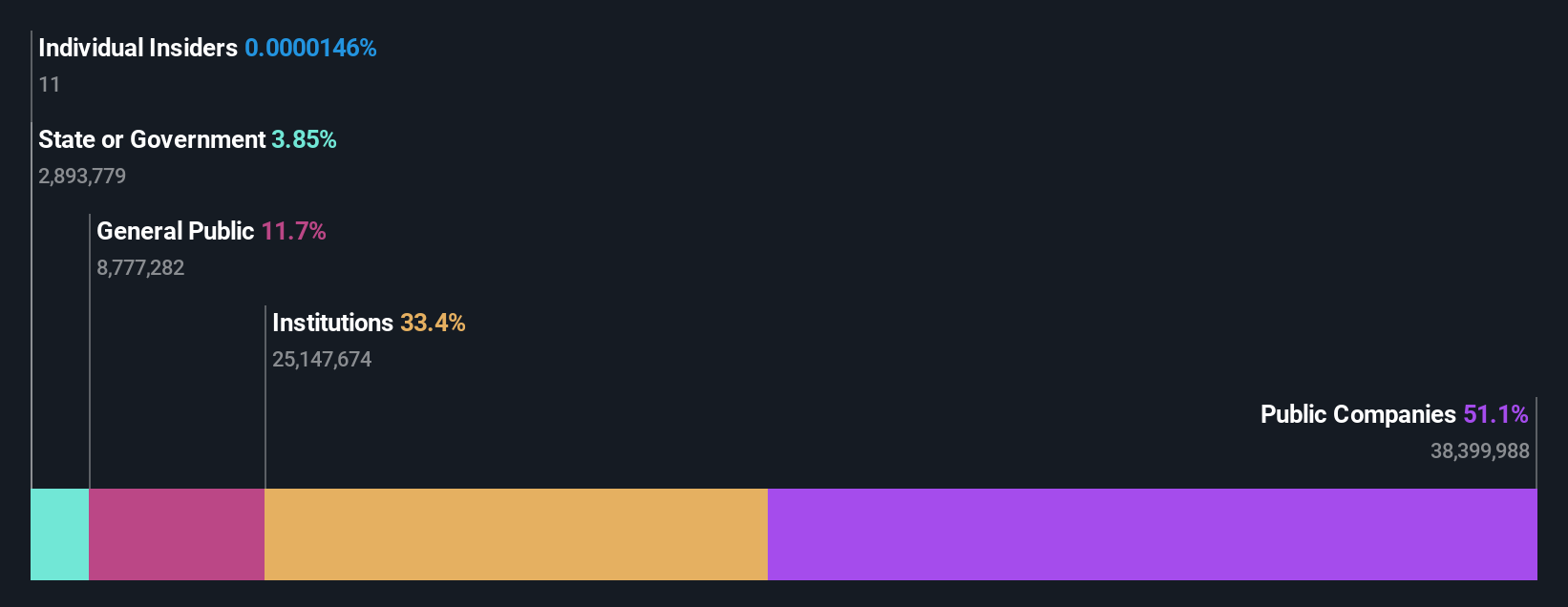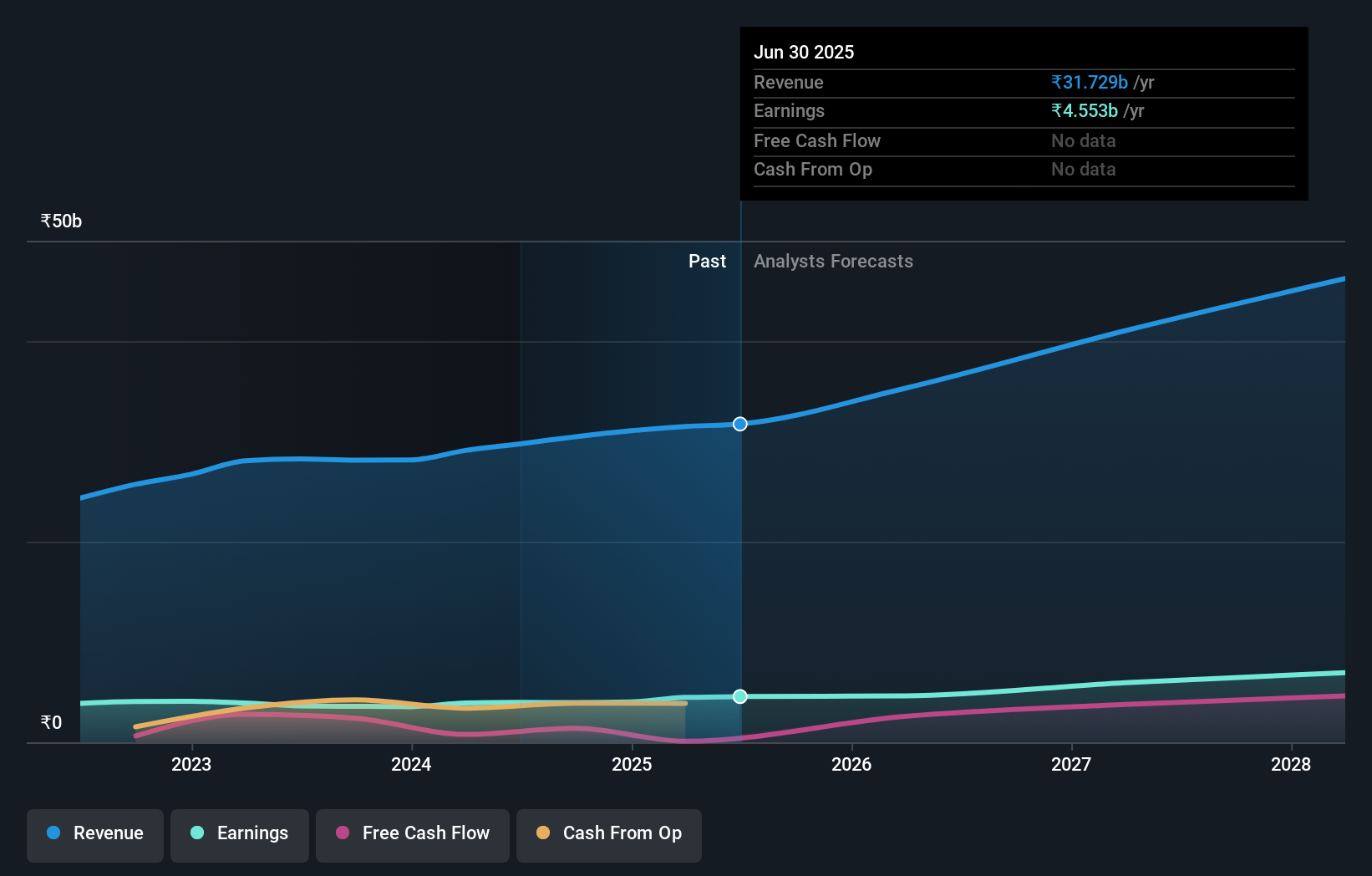Public companies who have a significant stake must be disappointed along with institutions after Timken India Limited's (NSE:TIMKEN) market cap dropped by ₹8.5b
Key Insights
- The considerable ownership by public companies in Timken India indicates that they collectively have a greater say in management and business strategy
- The largest shareholder of the company is The Timken Company with a 51% stake
- 33% of Timken India is held by Institutions
If you want to know who really controls Timken India Limited (NSE:TIMKEN), then you'll have to look at the makeup of its share registry. With 51% stake, public companies possess the maximum shares in the company. In other words, the group stands to gain the most (or lose the most) from their investment into the company.
While the holdings of public companies took a hit after last week’s 3.8% price drop, institutions with their 33% holdings also suffered.
In the chart below, we zoom in on the different ownership groups of Timken India.
View our latest analysis for Timken India

What Does The Institutional Ownership Tell Us About Timken India?
Institutional investors commonly compare their own returns to the returns of a commonly followed index. So they generally do consider buying larger companies that are included in the relevant benchmark index.
Timken India already has institutions on the share registry. Indeed, they own a respectable stake in the company. This suggests some credibility amongst professional investors. But we can't rely on that fact alone since institutions make bad investments sometimes, just like everyone does. It is not uncommon to see a big share price drop if two large institutional investors try to sell out of a stock at the same time. So it is worth checking the past earnings trajectory of Timken India, (below). Of course, keep in mind that there are other factors to consider, too.

Hedge funds don't have many shares in Timken India. The Timken Company is currently the largest shareholder, with 51% of shares outstanding. With such a huge stake in the ownership, we infer that they have significant control of the future of the company. For context, the second largest shareholder holds about 5.6% of the shares outstanding, followed by an ownership of 4.1% by the third-largest shareholder.
While studying institutional ownership for a company can add value to your research, it is also a good practice to research analyst recommendations to get a deeper understand of a stock's expected performance. There are plenty of analysts covering the stock, so it might be worth seeing what they are forecasting, too.
Insider Ownership Of Timken India
The definition of company insiders can be subjective and does vary between jurisdictions. Our data reflects individual insiders, capturing board members at the very least. Company management run the business, but the CEO will answer to the board, even if he or she is a member of it.
Most consider insider ownership a positive because it can indicate the board is well aligned with other shareholders. However, on some occasions too much power is concentrated within this group.
Our most recent data indicates that insiders own less than 1% of Timken India Limited. It's a big company, so even a small proportional interest can create alignment between the board and shareholders. In this case insiders own ₹32k worth of shares. It is good to see board members owning shares, but it might be worth checking if those insiders have been buying.
General Public Ownership
The general public-- including retail investors -- own 12% stake in the company, and hence can't easily be ignored. While this group can't necessarily call the shots, it can certainly have a real influence on how the company is run.
Public Company Ownership
Public companies currently own 51% of Timken India stock. It's hard to say for sure but this suggests they have entwined business interests. This might be a strategic stake, so it's worth watching this space for changes in ownership.
Next Steps:
While it is well worth considering the different groups that own a company, there are other factors that are even more important. Case in point: We've spotted 1 warning sign for Timken India you should be aware of.
If you are like me, you may want to think about whether this company will grow or shrink. Luckily, you can check this free report showing analyst forecasts for its future.
NB: Figures in this article are calculated using data from the last twelve months, which refer to the 12-month period ending on the last date of the month the financial statement is dated. This may not be consistent with full year annual report figures.
Valuation is complex, but we're here to simplify it.
Discover if Timken India might be undervalued or overvalued with our detailed analysis, featuring fair value estimates, potential risks, dividends, insider trades, and its financial condition.
Access Free AnalysisHave feedback on this article? Concerned about the content? Get in touch with us directly. Alternatively, email editorial-team (at) simplywallst.com.
This article by Simply Wall St is general in nature. We provide commentary based on historical data and analyst forecasts only using an unbiased methodology and our articles are not intended to be financial advice. It does not constitute a recommendation to buy or sell any stock, and does not take account of your objectives, or your financial situation. We aim to bring you long-term focused analysis driven by fundamental data. Note that our analysis may not factor in the latest price-sensitive company announcements or qualitative material. Simply Wall St has no position in any stocks mentioned.
About NSEI:TIMKEN
Timken India
Manufactures, sells, and distributes tapered and other roller bearings, components, accessories, and mechanical power transmission products in India, the United States, and internationally.
Flawless balance sheet with proven track record.
Similar Companies
Market Insights
Community Narratives





